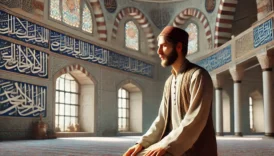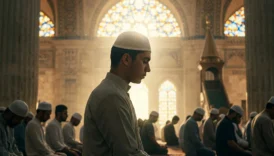The Significance Of Laylat Al-Qadr In Islam
Laylat al-Qadr is the holiest night in Islam. It marks the descent of the Qur’an and is filled with divine mercy, forgiveness, and blessings. Worship on this night is better than a thousand months. Laylat al-Qadr (The Night of Decree) is not just a night in the Islamic calendar—it is a spiritually transformative event.
This is the night in which the first verses of the Qur’an were revealed to the Prophet Muhammad (peace be upon him), initiating a new era in divine guidance.
- The Significance Of Laylat Al-Qadr In Islam
- Laylat Al-Qadr In The Qur’an
- The Revelation Of The Qur’an On This Night
- Prophetic Teachings On Its Virtue
- What Does “Better Than A Thousand Months” Mean?
- The Descent Of Angels And Peace Until Dawn
- What Should Be Asked On Laylat al-Qadr?
- Why Seek And Cherish This Night?
- Final Reflection
- References
It is a night when Allah’s mercy, forgiveness, and blessings are abundantly poured down upon those who turn to Him sincerely. Its value is confirmed by the Qur’an and the authentic sayings of the Prophet ﷺ.
(Tafsir Ibn Kathir, Tafsir al-Tabari; Sahih al-Bukhari)
Laylat Al-Qadr In The Qur’an
Laylat al-Qadr is the only night in the Islamic calendar to be honored with an entire chapter—Surah Al-Qadr (Chapter 97).
Here are the verses in Arabic, transliteration, and English:
Verse 1
Arabic:
إِنَّا أَنْزَلْنَاهُ فِي لَيْلَةِ الْقَدْرِ
Transliteration:
Innā anzalnāhu fī laylatil-qadr
Translation:
Indeed, We sent the Qur’an down during the Night of Decree.
Verse 2
Arabic:
وَمَا أَدْرَاكَ مَا لَيْلَةُ الْقَدْرِ
Transliteration:
Wa mā adrāka mā laylatul-qadr
Translation:
And what will make you know what the Night of Decree is?
Verse 3
Arabic:
لَيْلَةُ الْقَدْرِ خَيْرٌ مِّنْ أَلْفِ شَهْرٍ
Transliteration:
Laylatul-qadr khayrun min alfi shahr
Translation:
The Night of Decree is better than a thousand months.
Verse 4
Arabic:
تَنَزَّلُ الْمَلَائِكَةُ وَالرُّوحُ فِيهَا بِإِذْنِ رَبِّهِم مِّن كُلِّ أَمْرٍ
Transliteration:
Tanazzalul-malā’ikatu wa ar-rūḥu fīhā bi-idhni rabbihim min kulli amr
Translation:
The angels and the Spirit (Gabriel) descend therein by permission of their Lord for every matter.
Verse 5
Arabic:
سَلَامٌ هِيَ حَتَّىٰ مَطْلَعِ الْفَجْرِ
Transliteration:
Salāmun hiya ḥattā maṭlaʿil-fajr
Translation:
It is peace until the emergence of dawn.
(Tafsir Ibn Kathir, Tafsir al-Tabari)
The Revelation Of The Qur’an On This Night
The revelation of the Qur’an on Laylat al-Qadr signifies the beginning of divine guidance for all humanity.
The Qur’an was sent from the Preserved Tablet (al-Lawh al-Mahfuz) to the lowest heaven in its entirety on this night, then revealed gradually to the Prophet ﷺ over 23 years.
This connection between the Qur’an and Laylat al-Qadr elevates its sanctity.
It’s not just a night to remember a historical event—it’s a living opportunity to reconnect with the divine message and realign our lives with its guidance.
(Ihya Ulum al-Din, Imam al-Ghazali; Tafsir al-Kabir)
Prophetic Teachings On Its Virtue
The Prophet Muhammad ﷺ spoke extensively about Laylat al-Qadr and emphasized seeking it during the last ten nights of Ramadan, especially on the odd-numbered nights.
Hadith:
“Whoever spends Laylat al-Qadr in prayer, out of faith and seeking reward, will have all his past sins forgiven.”
(Sahih al-Bukhari, Sahih Muslim)
He ﷺ used to increase his worship during the last ten nights—staying up all night, waking his family, and tightening his waistcloth (an expression for exerting himself in worship).
This level of devotion highlights the spiritual weight of this sacred night.
(Muwatta Malik, Book of I’tikaf)
What Does “Better Than A Thousand Months” Mean?
Allah mentions that Laylat al-Qadr is better than a thousand months—equivalent to over 83 years.
That means a single sincere prayer, recitation, or act of charity on this night carries the reward of a lifetime.
This shows the depth of Allah’s mercy: He gives His servants opportunities to achieve immense spiritual rewards in very short periods.
One heartfelt repentance, one tear shed in humility, one sincere act of worship on this night may change your entire destiny.
(Lata’if al-Ma’arif by Ibn Rajab; Tafsir al-Qurtubi)
The Descent Of Angels And Peace Until Dawn
One of the unique features of Laylat al-Qadr is the descent of angels and the Spirit (Jibreel).
This symbolizes the closeness of the divine realm to the earthly realm, and the abundance of peace, mercy, and divine approval that fills the atmosphere.
Qur’an:
تَنَزَّلُ الْمَلَائِكَةُ وَالرُّوحُ فِيهَا
“They descend with every decree by the command of their Lord.”
It is also called the “Night of Peace”—a night in which Satan is powerless, and the heart of the believer is enveloped in divine tranquility and hope.
(Tafsir al-Sa’di)
What Should Be Asked On Laylat al-Qadr?
When Aisha (may Allah be pleased with her) asked the Prophet ﷺ what to say if she encountered Laylat al-Qadr, he taught her the following du’a:
Arabic:
اللَّهُمَّ إِنَّكَ عَفُوٌّ تُحِبُّ الْعَفْوَ فَاعْفُ عَنِّي
Transliteration:
Allahumma innaka ‘afuwwun tuḥibbu al-‘afwa fa‘fu ‘annī
Translation:
O Allah, You are Forgiving and love to forgive, so forgive me.
This short but profound du’a encompasses the spirit of the night—hope in Allah’s mercy, admission of one’s shortcomings, and turning fully to Allah in humility.
(Jami’ al-Tirmidhi)
Why Seek And Cherish This Night?
The exact night of Laylat al-Qadr is not specified, and for good reason.
The Prophet ﷺ taught us to search for it in the last ten nights of Ramadan, particularly on the odd-numbered nights (21st, 23rd, 25th, etc.).
Hadith:
“Seek Laylat al-Qadr in the odd nights of the last ten nights of Ramadan.”
(Sahih al-Bukhari)
This encourages consistent devotion and heightened spiritual awareness, as we are never certain which night it is.
Every night becomes a moment of hope, renewal, and closeness to Allah.
Final Reflection
Laylat al-Qadr is a night unlike any other—a night of mercy, peace, and life-changing forgiveness.
It is not just a memory of revelation but a living gateway to spiritual transformation, offered anew each year.
Those who embrace it with sincere hearts, pure intentions, and devoted worship will find their sins forgiven, their souls uplifted, and their bond with Allah strengthened.
Let us not miss this divine opportunity. In every sajdah, in every verse recited, in every whispered du’a, may we draw nearer to the One who waits for us with forgiveness and love.
References
- Sahih al-Bukhari – Book of Laylat al-Qadr
- Sahih Muslim – Kitab al-Salat
- Tafsir Ibn Kathir
- Tafsir al-Tabari
- Tafsir al-Sa’di
- Tafsir al-Qurtubi
- Jami’ al-Tirmidhi
- Ihya Ulum al-Din, Imam al-Ghazali
- Lata’if al-Ma’arif, Ibn Rajab
- Muwatta Malik – Book of I’tikaf





